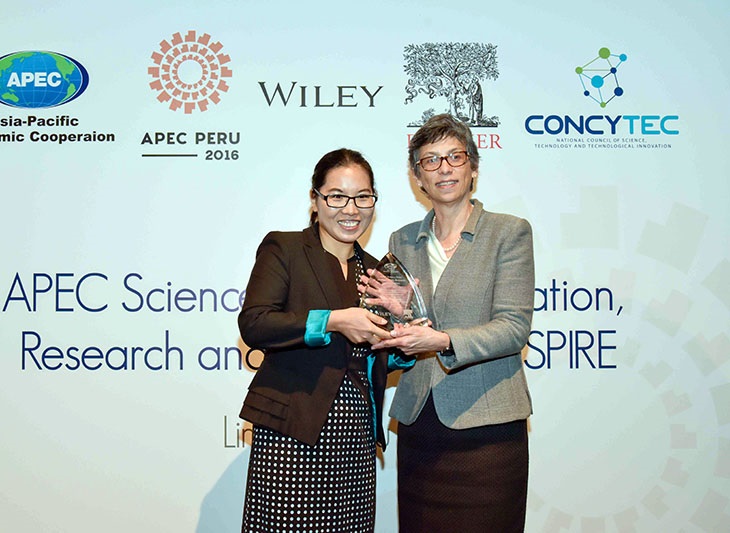Food Safety Game-Changer Named Top Innovator

Science, technology and innovation officials from the 21 APEC member economies have named cutting-edge food safety researcher Dr Hua Kuang of China the Asia-Pacific’s leading young innovator.
Dr Kuang, 34, was awarded the 2016 APEC Science Prize for Innovation, Research and Education for developing low-cost biosensors that detect food sanitation hazards. Produced in partnership with experts in other APEC economies, her patented technologies have been widely marketed and used to improve food safety for hundreds of millions of people in China and beyond.
The award, known as the ASPIRE Prize, was presented to Dr Kuang in Lima, alongside a meeting of officials and private sector representatives here this week to flesh out measures for establishing more innovation-friendly conditions in the region.
“Dr Kuang’s innovative and accessible detection technologies are proving to be a real breakthrough for protection against foodborne diseases,” noted Gisella Orjeda, President of the Peruvian National Council for Science, Technology and Technological Innovation—host of the ASPIRE Prize presentation ceremony and champion of this year’s award theme: Technologies for Food Security.
“Her work demonstrates the crucial role cross-border research is playing to ensure safe, secure food supplies and which is being led by a new era of scientists in the Asia-Pacific,” Orjeda continued. “It also underscores the importance of greater policy action by the region’s governments and the private sector to facilitate it.”
Dr Kuang is a Professor at Jiangnan University’s School of Food Science and Technology in Wuxi, China. She has authored 22 food analysis patents and, in China, over 80 per cent of mycotoxin immunoassay strips used to quickly test for foodborne toxins are based on her patented technologies.
“Understanding the unique hazards involved in food production is a critical way to promote food safety,” said Dr Kuang. “We are making important strides in our efforts to apply new food safety detection technologies in the Asia-Pacific. The key is for the scientific community to continue to work together to take this undertaking forward to more fully capture the benefits.”
“Building support for the region’s young, collaboration-minded researchers will be key to meeting food demand as the world’s population rises and climate change impacts industry output,” added Chen Linhao, Chair of the APEC Policy Partnership for Science, Technology, and Innovation, which administers the annual ASPIRE Prize.
The award program recognizes outstanding cross-border research led by scientists under 40 years of age. As this year’s ASPIRE Prize winner, Dr Kuang also received USD 25,000 in prize money sponsored by Wiley and Elsevier, publishers of scholarly scientific knowledge.
“Scientific collaboration across the Asia-Pacific is driving the advancement of research and innovation worldwide,” said Mark Allin, President and CEO of Wiley. “The work of young researchers like Dr Kuang is enhancing our understanding of food safety and security and bringing forward innovative solutions to help us mitigate threats to global supply chains of safe and nutritious food.”
“Dr Kuang’s research has the potential to save lives and curb the negative economic consequences that come with food insecurity,” concluded Youngsuk “Y.S.” Chi, Chairman of Elsevier. “We are inspired by the contribution of this year’s ASPIRE winner and her fellow nominees in the creation of knowledge that brings new hope.”
# # #
For additional information, or to arrange possible media interviews, please contact:
David Hendrickson (in Lima) +65 9137 3886 at [email protected]
Michael Chapnick +65 9647 4847 at [email protected]
More on APEC meetings, events, projects and publications can be found on www.apec.org. You can also follow APEC on Twitter and join us on Facebook and LinkedIn.

